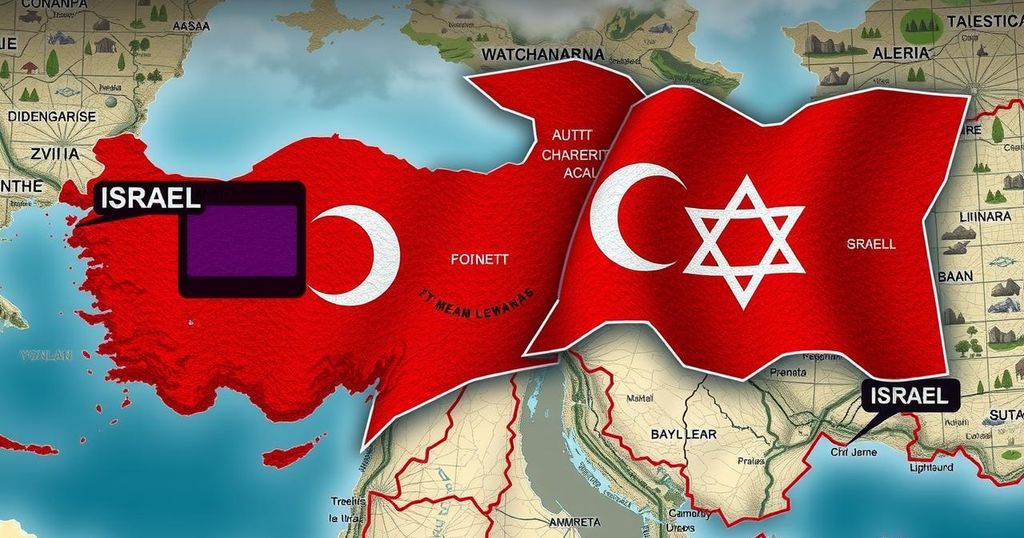This analysis explores the shifting geopolitical landscape of Syria following the removal of Bashar Assad. Israel has rapidly established a military presence to counter perceived threats, while Turkey aims to exert influence in the north against Kurdish groups. Both nations’ actions reveal their strategic objectives amid the instability, focusing on border control and regional stability in the post-Assad era.
The geopolitical landscape of Syria is undergoing significant transformation in the wake of the recent ousting of long-time dictator Bashar Assad. With Israel and Turkey intensifying their military and political maneuvers, the blurring of Syria’s borders has taken center stage. Following Assad’s fall to Islamist-led factions, Israeli forces have swiftly moved into a buffer zone that had remained established for five decades, responding to perceived threats from Iran-backed groups including Hezbollah and Hamas. Prime Minister Benjamin Netanyahu has asserted that Israel will not allow extremist factions to exploit the power vacuum, emphasizing that military measures will persist until a new Syrian regime, now led by Hayat Tahrir Al-Sham, affirms its commitment to long-standing agreements.
Meanwhile, Turkey is asserting its influence over a broader swath of northern Syria, actively opposing Kurdish forces linked to the PKK and expanding the reach of the Syrian National Army, which has gained important territories. President Recep Tayyip Erdogan’s ambitions include establishing a continuous buffer zone along the extensive Syria-Turkey border. Control of such territory is vital for Turkey as it seeks to neutralize Kurdish threats while managing a significant refugee crisis stemming from the prolonged conflict. The international community, particularly under the forthcoming leadership of US President-elect Donald Trump, is anticipating Turkey’s strategic role in the future governance of Syria.
As Israel enhances its position in the Golan Heights – territory of strategic military value and agricultural productivity – local leaders express varied opinions regarding the Israeli presence. In Majdal Shams, the Druze community perceives Israel’s military advances as necessary for security, especially after escalating rocket attacks from Hezbollah. Community leader Dolan Abu Salah remarked, “If we see that the new regime is potentially another terrorist group that will set the agenda, then the security zone must be permanent.”
Turkey’s involvement in the region is underscored by Foreign Minister Hakan Fidan’s statements emphasizing that Ankara does not seek direct control over Syria, but rather recognition as a legitimate partner in shaping the country’s future. It reflects Turkey’s strategic interest in forming stable governance structures in Syria to address the influx of refugees and to prepare for economic reconstruction post-conflict. Analysts suggest a favorable outcome in Syria could enhance Erdogan’s standing as a regional leader, countering his declining domestic popularity.
As the situation in Syria evolves, the intertwined interests of these regional powers signal the potential for a significant realignment in Middle Eastern politics, with all eyes on how the new Syrian political reality will unfold and the implications it holds for regional security.
The analysis addresses the geopolitical shifts in Syria following the destabilization of Bashar Assad’s regime, focusing particularly on the actions of Israel and Turkey. Both nations are rewriting the local strategic landscape by leveraging military actions and political alliances in response to the new power dynamics within Syria. The article highlights ongoing concerns for security, territorial control, and the overarching implications for the region, particularly in the context of the ongoing war and the inflow of refugees into Turkey.
In conclusion, the recent changes in Syria’s leadership have prompted urgent military and political maneuverings by both Israel and Turkey. As they compete to shape the future of Syria, their actions reflect broader strategic objectives, including security concerns and regional influence. The situation remains fluid, and the evolving alliances between these powers will be crucial for the stability of Syria and the surrounding region in the years to come.
Original Source: www.jpost.com






